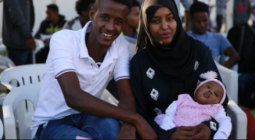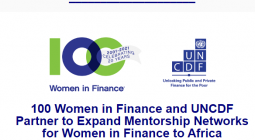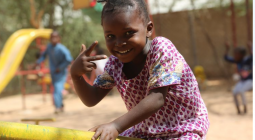UNCDF and KIT Form Partnership to Address Financial Needs of Migrant Households

(New York, New York USA, and Amsterdam, The Netherlands).
The United Nations Capital Development Fund (UNCDF) and KIT Royal Tropical Institute today announced a partnership for a major new research initiative to assess the financial needs and preferences of more than 4,000 remittance-sending migrants and their remittance-receiving family members. The research will focus on the customers of financial-service providers in Africa and Asia who have teamed up with UNCDF in global partnerships (the first seven of which were recently announced) to advance financial services for migrant households The UNCDF/KIT research will analyze profile and transaction data from institutional databases, and employ lean-data surveys to map the financial resilience level of migrants and their families, as well as their access and usage of remittance products. This quantitative research will be combined with qualitative behavioral research across a targeted sample regarding the customer journey, jobs, and behavioral biases and motivations around uptake of digital financial products. Key to the research initiative is an explicit and systematic focus on gender.
KIT Royal Tropical Institute, an independent institute focused on assisting private corporations, governments, and NGOs around the world to build inclusive and sustainable societies, will lead a research consortium, which also includes Butterfly Works and Aflatoun International. Along with acting as lead project executive for the UNCDF partnership, KIT will design and drive the research agenda in collaboration with UNCDF’s in-house research experts. Butterfly Works will conduct the qualitative behavioural research that will lead to a human-centered design toolkit for remittance service providers to use to adapt their financial product portfolio to offer more suitable products for migrant households. Aflatoun International’s contribution is the design of migrant-centric, gender-responsive digital financial literacy toolkits in a modular format that can be adopted and deployed by any remittance service provider in a plug-n-play model for their users.
In keeping with its identity as an agency of the United Nations, UNCDF will make the research findings and toolkits available as public goods upon project completion, expected 30 April 2022.
The KIT partnership reflects the integrated, 360-degree approach that UNCDF has chosen to take in its work on migration and remittances. The starting point for the programme, which brings together the full range of stakeholders—policymakers, regulators, providers of remittances and other financial services, researchers focused on a variety of disciplines, member states and the international community, and migrants themselves—from both sending and receiving countries, recognizes that remittances’ enormous potential cannot be tapped unless the entire remittance value chain is addressed holistically, employing both quantitative and qualitative research methods.
“Even with the exponentially expanding quantum of transactional data available for analysis, data alone cannot tell the whole story, much less create change on its own,” said Premasis Mukherjee, UNCDF Digital Finance and Remittances Expert. “Change requires more than knowledge, and knowledge is more than facts. The power of this new partnership with KIT is that it integrates rigorous research at massive scale with the reimagining of financial products based on actionable insights, and, critically, with customer engagement. Remittances are already a lifeline for households throughout the developing world, but we have barely begun to tap their potential as the gateway product to full financial inclusion. This new partnership, shaped also by UNCDF’s ongoing work with remittance-focused policymakers and regulators, is a vital step towards that vision.”
As noted, the programme will employ a gender lens. KIT will focus on both women migrants and women receivers of remittances, in part by conducting women-only focus group discussions and surveys. These activities will not only yield gender-inclusive insights, but will specifically differentiate the motivations, knowledge and skills, perception and market barriers that women experience in accessing and using digital and formal remittances. The behavioral biases specific to the women users, and their role in creating financial resilience for the migrant families, will also be carefully included in the analysis.
“This partnership offers an innovative approach to remittances. Our migrant centric approach will consider remittances through the eyes of senders and receivers and unravel the real stories behind the users, their challenges, needs and preferences,” said Maria Vitores, Senior Advisor Financial Inclusion with KIT Royal Tropical Institute “The approach will also be gender-responsive, so that ultimately different women’s segments can benefit from services that work for them. The results of this extensive research will be at the core of new suitable, gender-responsive and innovative products, as well as informed policies to enhance the access to and usage of remittances and strengthen the financial resilience of migrants households.”
Along with making the toolkits publicly available upon project completion, UNCDF anticipates hosting a series of webinars and issuing short publications aimed at both international audiences and at stakeholders in the project countries of Bangladesh, Ethiopia, Myanmar, Senegal, Nepal, Republic of Congo, Singapore, Republic of Korea, United Kingdom, and United Arab Emirates.
May 2021
UNCDF




